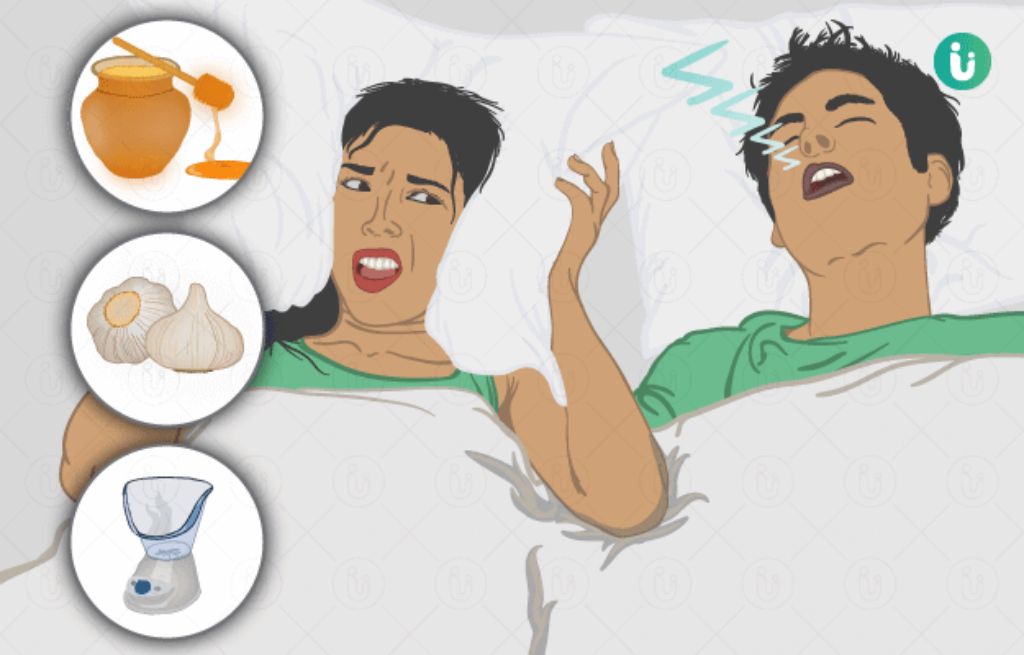
This information will consider lifestyle changes and home remedies for snoring. It is important to distinguish between benign snoring and potential sleep apnea, a serious sleep disorder. Silencing snoring can be challenging, and the appropriate solution may vary depending on the cause of the snoring. Here are some general tips and methods that might help reduce or eliminate snoring:
Lifestyle Changes and Home Remedies for Snoring
-
Avoid Alcohol:
- Avoiding alcohol is a key lifestyle change to mitigate snoring. Consuming alcohol within three hours of bedtime can lead to the relaxation of airway muscles during sleep, contributing to snoring. By refraining from alcohol close to bedtime, you can reduce the likelihood of muscle relaxation in the throat, helping to keep the airway open and minimizing snoring. Opting for non-alcoholic alternatives or consuming alcohol earlier in the evening may contribute to a more restful and quieter night’s sleep.
-
Medication Awareness:
-
It’s important to be mindful of the medications you take, particularly benzodiazepines, as they have the potential to relax muscles, which can contribute to snoring. Benzodiazepines, such as alprazolam (Xanax), clonazepam (Klonopin), diazepam (Valium), and lorazepam (Ativan), are commonly prescribed for conditions like anxiety and insomnia. However, they can also induce muscle relaxation in the throat, potentially worsening snoring.
If you are taking medications within the benzodiazepine class, it’s advisable to discuss with your healthcare provider. They can provide guidance on the timing of medication administration and may explore alternative medications or treatment options that have a reduced impact on muscle relaxation during sleep. It’s crucial to balance the management of the underlying condition for which the medication is prescribed with the potential side effects, such as increased snoring. Regular communication with your healthcare professional ensures a comprehensive approach to your overall health and well-being.
.

-
-
Weight Management:
- Weight management is a crucial aspect of addressing snoring, especially if overweight or obese. Excess fat tissue in the neck and throat can contribute to the narrowing of airways, increasing the likelihood of snoring. If you are overweight, losing weight through a combination of a balanced diet and regular exercise can be beneficial for reducing snoring.A few considerations for weight management in the context of snoring include:
- Healthy Lifestyle Choices: Adopting a balanced and nutritious diet along with regular physical activity supports overall health and can aid in weight loss.
- Consultation with Healthcare Professionals: Before embarking on a weight loss journey, it’s advisable to consult with healthcare professionals, such as a dietitian or nutritionist, to create a personalized and sustainable plan.
- Gradual Weight Loss: Aim for gradual and sustainable weight loss, as crash diets or extreme measures may not be effective or healthy in the long term.
- Physical Activity: Regular exercise not only contributes to weight loss but also has additional benefits for overall health, including improved sleep quality.
- Consistency: Consistency in maintaining a healthy lifestyle is key. Small, consistent changes over time can lead to sustainable weight management.
- Weight management is a crucial aspect of addressing snoring, especially if overweight or obese. Excess fat tissue in the neck and throat can contribute to the narrowing of airways, increasing the likelihood of snoring. If you are overweight, losing weight through a combination of a balanced diet and regular exercise can be beneficial for reducing snoring.A few considerations for weight management in the context of snoring include:
-
Nasal Obstruction Remedies:
- Addressing nasal congestion is an essential component of managing snoring. Here are some effective nasal obstruction remedies that can help reduce snoring:
- Saline Rinses:
- Nasal saline rinses involve flushing the nasal passages with a saltwater solution. This can help clear mucus and reduce nasal congestion, making it easier to breathe through the nose. Over-the-counter saline nasal sprays or neti pots can be used for this purpose.
- Allergen Reduction:
- Identify and minimize exposure to allergens in your bedroom. Common allergens include dust mites, pet dander, and pollen. Regular cleaning, using allergen-proof bedding, and keeping pets out of the bedroom can help reduce allergic reactions that contribute to nasal congestion.
- Humidification:
- Using a humidifier in the bedroom can add moisture to the air, preventing the nasal passages from drying out. This can be particularly helpful in reducing swelling and congestion in the nasal tissues. Ensure that the humidifier is clean to prevent the growth of mold and bacteria.
- Decongestant Nasal Sprays:
- Short-term use of over-the-counter decongestant nasal sprays may provide relief by temporarily reducing nasal congestion. However, prolonged use can lead to rebound congestion, so it’s essential to use them as directed and under the guidance of a healthcare professional.
- Allergy Medications:
- If nasal congestion is due to allergies, antihistamines or other allergy medications may help alleviate symptoms. Consult with a healthcare provider to determine the most suitable medication for your specific situation.
- Nasal Strips:
- External nasal strips can be applied to the outside of the nose to help open nasal passages. They work by physically pulling open the nostrils, providing more space for airflow.
- Elevate the Head of the Bed:
- Raising the head of the bed slightly can help reduce nasal congestion by promoting drainage and preventing mucus from pooling in the throat.
- Saline Rinses:
- Addressing nasal congestion is an essential component of managing snoring. Here are some effective nasal obstruction remedies that can help reduce snoring:
-
Quit Smoking:
- Quitting smoking is a crucial step in improving overall health and reducing the likelihood of snoring. Smoking has multiple adverse effects on the respiratory system and can contribute to snoring in several ways. Here are some reasons why quitting smoking is beneficial for addressing snoring:
- Upper Airway Irritation: Smoking can irritate and inflame the upper airway, including the throat and nasal passages. This irritation can lead to increased snoring as the airway becomes more constricted.
- Nicotine Withdrawal at Night: Nicotine is a stimulant that can lead to increased heart rate and heightened alertness. When smokers go without nicotine during sleep, withdrawal symptoms may occur, disrupting sleep patterns and potentially contributing to snoring.
- Increased Swelling and Irritation: Smoking can cause increased swelling and irritation in the upper airway, making it more likely for tissues to vibrate during breathing, resulting in snoring.
- Secondhand Smoke: Even exposure to secondhand smoke can increase the risk of snoring. Living in a smoking environment can contribute to airway irritation and compromise respiratory function.
- General Health Improvement: Quitting smoking has numerous health benefits, including improved lung function, reduced risk of respiratory infections, and decreased inflammation. These improvements can positively impact overall respiratory health and contribute to a reduction in snoring.
Quitting smoking is a challenging but worthwhile endeavor. There are various resources and support systems available to help individuals quit smoking, including smoking cessation programs, medications, and support from healthcare professionals.

- Quitting smoking is a crucial step in improving overall health and reducing the likelihood of snoring. Smoking has multiple adverse effects on the respiratory system and can contribute to snoring in several ways. Here are some reasons why quitting smoking is beneficial for addressing snoring:
-
Sleep Positioning:
- Changing sleep positions is a simple yet effective strategy to alleviate snoring. Sleeping on your back can cause the tongue and soft palate to collapse to the back of the throat, contributing to snoring. To help keep the airways open and reduce snoring, consider sleeping on your side. This positional adjustment can minimize the likelihood of the tongue obstructing the airway, promoting smoother breathing and a quieter sleep environment. To enhance side-sleeping habits, you may find it helpful to use a body pillow or other aids that provide support and encourage a comfortable sleeping position on your side.
-
Head Elevation:
-
Elevating the head during sleep is a practical approach to minimize snoring, especially when the snoring is related to positional factors. Here are some methods for head elevation that may help reduce snoring:
- Extra Pillow:
- Simply adding an extra pillow under your head can elevate it slightly, helping to keep the airways open. However, it’s essential to maintain a comfortable sleeping position to ensure a good night’s sleep.
- Wedge Pillow:
- A wedge pillow is a specialized pillow with a triangular shape that is designed to elevate the upper body. Placing a wedge pillow under the head and upper body can provide a gentle incline, reducing the likelihood of the tongue and soft palate collapsing to the back of the throat.
- Bed Elevation:
- If you prefer, you can elevate the entire head of the bed by placing blocks or risers under the bedposts. This method provides a consistent incline and can be an effective way to reduce snoring.
- Adjustable Beds:
- Some people find relief from snoring by using an adjustable bed that allows them to raise the head portion. This can be particularly beneficial for those who want the flexibility to change their sleeping position.
Elevating the head helps gravity work in your favor by preventing the tongue and soft palate from obstructing the airway. It can be especially useful for individuals who snore more when lying flat on their backs.
While these methods can be helpful for many people, it’s essential to find the most comfortable and effective solution for your specific needs. If snoring persists despite trying various home remedies, or if you have other concerns about your sleep, consulting with a healthcare professional is recommended for a thorough evaluation and personalized advice.
- Extra Pillow:
-
When to Consult a Doctor:
- If lifestyle changes and home remedies do not alleviate snoring.
- If you experience additional symptoms such as waking up gasping for air, excessive daytime sleepiness, or tiredness.
- Concerns about potential sleep apnea, which may require professional evaluation and treatment.
It’s essential to recognize the distinction between occasional snoring and symptoms that may indicate a more serious underlying sleep disorder. If there are persistent concerns or if sleep apnea is suspected, consulting a healthcare professional is crucial for proper diagnosis and management.
Submitted by ADE for Naijatipsland
- 60 Injured In Stadium Crush As Kenya Inaugurates President
- Belkin SoundForm Pulse wireless earbuds review: Premium sound, affordable price
- Court gives Abba Kyari nod to file more evidence against FG’s extradition suit
- Nigeria Secures Deal With Russian Company To Revamp Ajaokuta Steel Plant
- Three Anambra monarchs withdraw Ifeanyi Ubah’s chieftaincy titles
- Neston Group Recent Available Job Opportunity – Apply Now!










